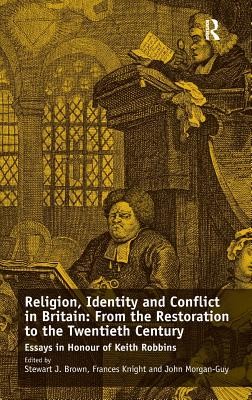
- We will send in 10–14 business days.
- Author: Frances Knight
- Publisher: Routledge
- Year: 2013
- Pages: 294
- ISBN-10: 1409451488
- ISBN-13: 9781409451488
- Format: 15.6 x 23.4 x 1.8 cm, hardcover
- Language: English
- SAVE -10% with code: EXTRA
Religion, Identity and Conflict in Britain: From the Restoration to the Twentieth Century (e-book) (used book) | bookbook.eu
Reviews
Description
The British state between the mid-seventeenth century to the early twentieth century was essentially a Christian state. Christianity permeated society, defining the rites of passage - baptism, first communion, marriage and burial - that shaped individual lives, providing a sense of continuity between past, present and future generations, and informing social institutions and voluntary associations. Yet this religious conception of state and society was also the source of conflict. The Restoration of the monarchy in 1660 brought limited toleration for Protestant Dissenters, who felt unable to worship in the established Church, and there were challenges to faith raised by biblical and historical scholarship, science, moral questioning and social dislocations and unrest. This book brings together a distinguished team of authors who explore the interactions of religion, politics and culture that shaped and defined modern Britain. They consider expressions of civic consciousness in the expanding towns and cities, the growth of Welsh national identity, movements for popular education and temperance reform, and the influence of organised sport, popular journalism, and historical writing in defining national life. Most importantly, the contributors highlight the vital role of religious faith and religious institutions in the understanding of the modern British state.
EXTRA 10 % discount with code: EXTRA
The promotion ends in 19d.14:12:19
The discount code is valid when purchasing from 10 €. Discounts do not stack.
- Author: Frances Knight
- Publisher: Routledge
- Year: 2013
- Pages: 294
- ISBN-10: 1409451488
- ISBN-13: 9781409451488
- Format: 15.6 x 23.4 x 1.8 cm, hardcover
- Language: English English
The British state between the mid-seventeenth century to the early twentieth century was essentially a Christian state. Christianity permeated society, defining the rites of passage - baptism, first communion, marriage and burial - that shaped individual lives, providing a sense of continuity between past, present and future generations, and informing social institutions and voluntary associations. Yet this religious conception of state and society was also the source of conflict. The Restoration of the monarchy in 1660 brought limited toleration for Protestant Dissenters, who felt unable to worship in the established Church, and there were challenges to faith raised by biblical and historical scholarship, science, moral questioning and social dislocations and unrest. This book brings together a distinguished team of authors who explore the interactions of religion, politics and culture that shaped and defined modern Britain. They consider expressions of civic consciousness in the expanding towns and cities, the growth of Welsh national identity, movements for popular education and temperance reform, and the influence of organised sport, popular journalism, and historical writing in defining national life. Most importantly, the contributors highlight the vital role of religious faith and religious institutions in the understanding of the modern British state.


Reviews